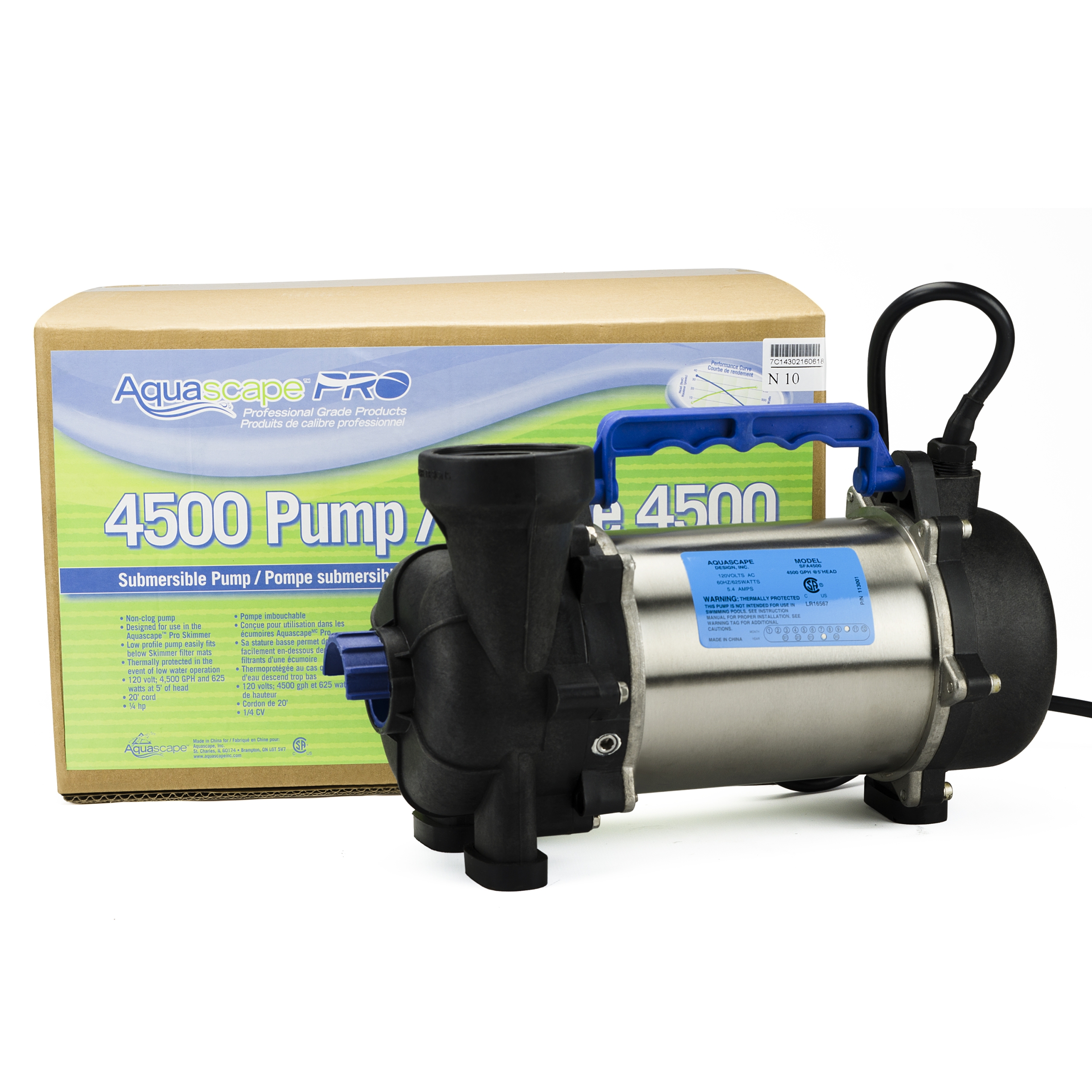[av_heading heading=’Best Pond Pump Information 2021′ tag=’h2′ link_apply=” link=’manually,http://’ link_target=” style=’blockquote modern-quote modern-centered’ size=” subheading_active=” subheading_size=’15’ margin=” margin_sync=’true’ padding=’10’ color=” custom_font=” av-medium-font-size-title=” av-small-font-size-title=” av-mini-font-size-title=” av-medium-font-size=” av-small-font-size=” av-mini-font-size=” av_uid=’av-kqih4y2q’ custom_class=” admin_preview_bg=”][/av_heading]
[av_textblock size=” font_color=” color=” av-medium-font-size=” av-small-font-size=” av-mini-font-size=” av_uid=’av-kqih6rhf’ custom_class=” admin_preview_bg=”]
Pumps keep the water in your pond healthy. They help evenly spread nutrients in the water to fish, plants and other aquatic life. Running water prevents stagnation and cuts down on algae and mosquitoes. Keeping the water moving ensures that oxygen levels are distributed throughout the pond. Pumps also provide power for a pond’s water features, like waterfalls and fountains.
This guide will help you learn about the best pond pumps for your garden.
~
The best water pumps for your pond and its fountain or waterfall come in variety of types and styles. They include submersible, external, magnetic drive and direct drive. Each of these water garden pumps offers its own advantages.
Submersible Pumps: These pumps are designed to work while wholly submerged in water. Typically, they are installed in the deepest part of the pond. Submersible pumps can be placed either directly into your pond or in a skimmer box or pond vault.
- Easy to install.
- Work well in environments that capitalize on a natural setting.
- No need to camouflage the pump.
- Run very quietly so there’s no distracting noise in your garden.
- Submersible pumps can be used to drain your pond, if needed.
- Range in pumping size from 50 to 5,000 gallons per hour.
- Can generate higher energy costs than other pump types.
- For smaller ponds, submersible pumps are generally more economical.
Tip: Some submersible pumps use oil to operate. If the pump seal breaks and leaks harmful oil coolant into the water, fish can be hurt or killed. If you have fish or other aquatic life in your pond, you’ll want to look for a submersible model that does not use oil.
External Pumps: External pumps can move a high volume of water, yet usually have lower energy costs than submersible pumps. They are not as quiet as submersible pumps. They should be placed in a dry location near your pond. External pumps are a lot more complicated to install. However, they are generally more reliable.
- Available as self-priming pumps able to draw their own water.
- Can be loud, disturbing the quiet of your garden.
- Work well for larger ponds that are 1,000 gallons or more.
- Offer long-lasting performance and easy repair.
- Require less routine maintenance than submersible pumps.
Tip: Pumps that are not self-priming can burn out a motor if the power shuts off momentarily and then comes back on. Protect against this by installing a check valve.
Magnetic Drive: In a magnetic-drive pump, an electrical charge creates a magnetic field that causes the magnet on the impeller to rotate and pump water. Since they have no seals to wear out, they require little maintenance. Occasionally, you will need to clean the impeller and its chamber for the most efficient operation.
- Completely sealed. Magnetic-drive pumps do not require lubrication.
- Because they don’t contain oil, magnetic-drive pumps are safer for ponds with fish, since oil leaks don’t occur.
- Don’t generate high head heights. Magnetic-drive pumps are unable to lift pond water vertically, which you might need to supply water to a fountain. They are not the best water pumps for fountains.
- Work best in cleaner environments with little or no debris.
- Highly efficient and cost-effective.
Direct Drive: Direct-drive pumps have an enclosed motor that is powered by electricity, which turns the impeller shaft.
- Achieve significant head height, so they are able to move water vertically. They are among the best water pumps for fountains and waterfalls.
- Typically more expensive to operate.
- Push water rather than pulling it.
- Not easily repaired.
Tip: Some models seal the motor in an oil-filled shell with seals around the cord and impeller shaft. These are risky to use if you have a pond stocked with fish. There is an ever-present danger of water contamination if a leak occurs. Many newer pumps, however, feature alternative lubrication that is safe for fish. Look for oil-free models if you have fish or other aquatic life in your pond.
[/av_textblock]
[av_image src=’https://aquascapes.com/wp-content/uploads/2009/11/20002_AquascapePRO3000_Main.jpg’ attachment=’6913′ attachment_size=’full’ align=’center’ styling=” hover=” link=” target=” caption=” font_size=” appearance=” overlay_opacity=’0.4′ overlay_color=’#000000′ overlay_text_color=’#ffffff’ copyright=” animation=’no-animation’ av_uid=’av-kqihaopb’ custom_class=” admin_preview_bg=”][/av_image]
[av_heading heading=’Pond Pump Calculations’ tag=’h2′ link_apply=” link=’manually,http://’ link_target=” style=’blockquote modern-quote modern-centered’ size=” subheading_active=” subheading_size=’15’ margin=” margin_sync=’true’ padding=’10’ color=” custom_font=” av-medium-font-size-title=” av-small-font-size-title=” av-mini-font-size-title=” av-medium-font-size=” av-small-font-size=” av-mini-font-size=” av_uid=’av-kqih797u’ custom_class=” admin_preview_bg=”][/av_heading]
[av_textblock size=” font_color=” color=” av-medium-font-size=” av-small-font-size=” av-mini-font-size=” av_uid=’av-kqih7p1r’ custom_class=” admin_preview_bg=”]
[/av_textblock]
[av_image src=’https://aquascapes.com/wp-content/uploads/2017/01/Illustration_PondlessWaterfall_1.jpg’ attachment=’7493′ attachment_size=’full’ align=’center’ styling=” hover=” link=” target=” caption=” font_size=” appearance=” overlay_opacity=’0.4′ overlay_color=’#000000′ overlay_text_color=’#ffffff’ copyright=” animation=’no-animation’ av_uid=’av-kqihaopb’ custom_class=” admin_preview_bg=”][/av_image]
[av_heading heading=’Pond Pump Features’ tag=’h2′ link_apply=” link=’manually,http://’ link_target=” style=’blockquote modern-quote modern-centered’ size=” subheading_active=” subheading_size=’15’ margin=” margin_sync=’true’ padding=’10’ color=” custom_font=” av-medium-font-size-title=” av-small-font-size-title=” av-mini-font-size-title=” av-medium-font-size=” av-small-font-size=” av-mini-font-size=” av_uid=’av-kqih797u’ custom_class=” admin_preview_bg=”][/av_heading]
[av_textblock size=” font_color=” color=” av-medium-font-size=” av-small-font-size=” av-mini-font-size=” av_uid=’av-kqih7p1r’ custom_class=” admin_preview_bg=”]
[/av_textblock]
[av_blog blog_type=’posts’ link=’category’ date_filter=” date_filter_start=” date_filter_end=” date_filter_format=’yy/mm/dd’ blog_style=’single-big’ bloglist_width=” columns=’3′ contents=’excerpt’ content_length=’content’ preview_mode=’auto’ image_size=’portfolio’ items=’3′ offset=’0′ paginate=’yes’ conditional=” av-desktop-hide=” av-medium-hide=” av-small-hide=” av-mini-hide=” av_uid=”]
[av_contact email=’orders@aquascapes.com’ title=’Have a question? Ready to order? Want to install a pond? Contact us!’ button=’Submit’ on_send=” sent=’Your message has been sent!’ link=’manually,http://’ subject=” autoresponder_email=’orders@aquascapes.com’ autorespond=” captcha=’active’ form_align=” color=” av_uid=’av-kqih5haw’ custom_class=” admin_preview_bg=”]
[av_contact_field label=’Name’ type=’text’ check=’is_empty’ options=” multi_select=” av_contact_preselect=” width=”][/av_contact_field]
[av_contact_field label=’E-Mail’ type=’text’ check=’is_email’ options=” multi_select=” av_contact_preselect=” width=”][/av_contact_field]
[av_contact_field label=’Subject’ type=’text’ check=’is_empty’ options=” multi_select=” av_contact_preselect=” width=”][/av_contact_field]
[av_contact_field label=’Message’ type=’textarea’ check=’is_empty’ options=” multi_select=” av_contact_preselect=” width=”][/av_contact_field]
[/av_contact]

